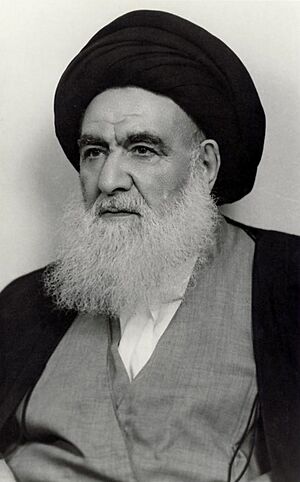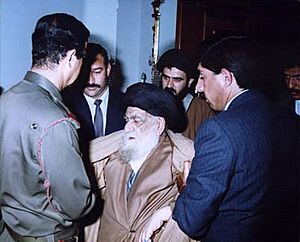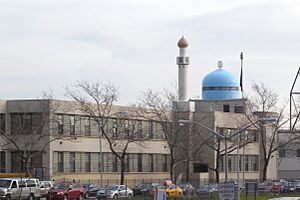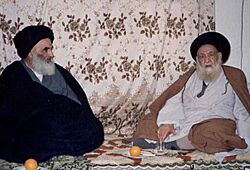Abu al-Qasim al-Khoei facts for kids
Quick facts for kids Grand Ayatollah Sayyid Abu al-Qasim al-Khoei |
|
|---|---|
| السيد أبو القاسم الموسوي الخوئي | |

Abu al-Qasim al-Khoei in his office at Najaf, 1970's
|
|
| Religion | Islam |
| Denomination | Shi'a |
| Personal | |
| Born | November 19, 1899 Khoy, West Azerbaijan, Sublime State of Persia |
| Died | August 8, 1992 (aged 92) Kufa, Ba'athist Iraq |
| Resting place | Imam Ali Shrine |
| Children |
|
| Parents | Ali-Akbar al-Khoei (father) |
| Senior posting | |
| Based in | Najaf, Iraq |
| Period in office | 1970–1992 |
| Predecessor | Muhsin al-Hakim |
| Successor | Abd al-A'la al-Sabziwari, Mohammad-Reza Golpaygani |
| Religious career | |
| Works | Mu'jam rijal al-hadith |
| Website | Official website: https://www.al-khoei.org |
Grand Ayatollah Sayyid Abu al-Qasim al-Musawi al-Khoei (![]() i/ˈɑːbuː æl ˈkɑːsɪm æl ˈxhuːi/ ah-BOO-_-AL-_-KAH-sim; Arabic: أبو القاسم الموسوي الخوئي; Persian: ابوالقاسم موسوی خویی; November 19, 1899 – August 8, 1992) was a very important Shia religious leader. He was an Iranian-Iraqi marja', which means he was a top religious authority. Many people consider him one of the most influential twelver scholars.
i/ˈɑːbuː æl ˈkɑːsɪm æl ˈxhuːi/ ah-BOO-_-AL-_-KAH-sim; Arabic: أبو القاسم الموسوي الخوئي; Persian: ابوالقاسم موسوی خویی; November 19, 1899 – August 8, 1992) was a very important Shia religious leader. He was an Iranian-Iraqi marja', which means he was a top religious authority. Many people consider him one of the most influential twelver scholars.
After another leader, Muhsin al-Hakim, passed away in 1970, al-Khoei became the spiritual leader for many Shia Muslims around the world. He held this important position until he died in 1992. After his death, Abd al-A'la al-Sabziwari briefly took over. Then, his former student, Ali al-Sistani, became the new leader. Many of al-Khoei's followers then looked to al-Sistani for guidance.
Contents
Biography
Abu al-Qasim al-Khoei was born in 1899 in the city of Khoy, which is in Iran. He grew up in Iran. When he was about 13 years old, he moved to Iraq with his older brother Abdullah. They settled in the holy city of Najaf.
In Najaf, al-Khoei began studying Shia theology with the city's scholars. He worked hard and eventually reached the high rank of Ayatollah. He also became a Marja', a top religious authority. Al-Khoei continued to live in Najaf. He spent the rest of his life teaching and guiding other scholars. He helped them learn enough to issue religious rulings based on Shia teachings.
Because he was such an important teacher and scholar in Najaf, he became a major leader for Shia Muslims worldwide. In 1971, after the death of Muhsin al-Hakim, he became the most prominent Grand Ayatollah. In this role, he supported many organizations around the world. These organizations helped people and offered scholarships to students studying theology.
Al-Khoei is known for creating a special way of thinking about Islamic law and its principles. He was also a leading expert in kalam (religious discussions), rijal (studying the lives of those who passed on religious traditions), fiqh (Islamic law), and tafseer (explaining the Qur'an). He was also interested in subjects like astronomy, mathematics, and philosophy.
Al-Khoei's position as a leading scholar was sometimes challenged. In the 1970s, another Grand Ayatollah, Mohammed Al-Shirazi, had different ideas from al-Khoei. They disagreed on whether religious leaders should directly govern a country.
After the Persian Gulf War, al-Khoei was arrested by Saddam Hussein. This happened after a conflict involving Shia Muslims. While he was arrested, he was taken to Baghdad and made to appear in public with Saddam Hussein. Eventually, Hussein allowed al-Khoei to return to Najaf. However, he was kept under house arrest. Al-Khoei passed away on August 8, 1992, in Najaf, at the age of 92. His student, Ali al-Sistani, led his funeral. He was buried in the Shrine of Imam Ali in Najaf.
Legacy
Welfare Work
Al-Khoei was very dedicated to setting up helpful organizations for Muslims everywhere. These organizations focused on welfare, social support, culture, and education. Here are some of the places he helped create:
- Imam Al-Khoei Benevolent Foundation in Queens, NY.
- al-Iman School in Queens, New York.
- As-Sadiq and Az-Zahra Schools in London.
- Imam al-Khoei Islamic Centre in London, U.K.
- Jamia-tul-Kauthar in Islamabad.
- Darul Hikmah in Najaf.
- Madinatul Ilm in Qom. This is one of the biggest theology centers for Shia Muslims. It has school buildings and homes for 500 families.
- As-Sayyid al-Khoei Centre in Bangkok.
- As-Sayyid al-Khoei Centre in Dhaka.
- Imam al-Khoei Orphanage in Beirut.
- Imam-e-Zamana Mission in Hyderabad.
- Najafi House in Mumbai.
He also supported about 1,000 theology students from Iraq and other countries. These countries included Lebanon, Iran, Syria, Persian Gulf States, India, Pakistan, Afghanistan, and South East Asia. He provided money for their schools, living costs, and teacher salaries.
His Students
One of his former students, Ali al-Sistani, is now the most senior Shia cleric in Iraq. Many people believe he has a lot of influence over the Shia majority in Iraq. The success of al-Sistani's moderate Shia politics in Iraq is largely due to the teachings of his mentor, al-Khoei.
Another important student of al-Khoei was Muhammad-Sadiq Rohani. He also had a close relationship with al-Khoei. He was considered a high religious authority in Iran, along with Waheed Khurasani.
His Writings

Al-Khoei wrote many books and papers on different subjects. These included Islamic jurisprudence (Islamic law), mathematics, and astronomy. He wrote 37 books and papers, and most of them have been published. Some of his works include:
- Lectures in the Principles of Jurisprudence – 10 volumes
- Biographies of Narrators of Tradition – 24 volumes
- Islamic Law – 18 volumes
- Al-Bayan Fi Tafsir al-Quran (The Elucidation of the Exegesis of The Qur'an)
- Minhaju-us-Saliheen (The Path of the Righteous) – 2 volumes, reprinted many times (a guide for religious practice and law)
- Anthology of Religious Questions – A shorter version of The Path of the Righteous, available in many languages.
- Mabani al-Istinbat (Edifices of Deduction) – Principles of Jurisprudence
- Ajwad-at-Taqrirat (The Best of Regulations) – Principles of Jurisprudence
- Sharh-el-Urwatul-Wuthqa (Commentary on The Steadfast Handle) – Jurisprudence
- Treatise on Suspected Attire – Risala fil Libas Al-Mashkok, Evidential Jurisprudence
- Nafahat-ul Ijaz (The Fragrance of Miracles), defending the Qur'an
Online Presence
- Imam Al-Khoei Benevolent Foundation
Political Influence
Al-Khoei had different political ideas from Ayatollah Ruhollah Khomeini. They were "old rivals" when they both lived in Najaf. Al-Khoei disagreed with Khomeini's idea of Velayat-e faqih. This idea suggests that a ruling religious scholar should lead an Islamic Government. Al-Khoei called this idea a "bogus innovation" in Islam. Some scholars believe that al-Khoei's role in limiting Khomeini's ideas is often not fully recognized.
Even though many Shia Muslims were excited about the Iranian Revolution at first, al-Khoei openly told his followers to ignore Khomeini's political ideas. He kept alive the Shia tradition that separates religious authority from political power. He continued this until the excitement for Islamist rule lessened among Shia Muslims worldwide. He also deserves credit for the influence of "moderate Shia politics" in Iraq after Saddam Hussein's rule ended. This influence came through his student, Ali al-Sistani, who became the leading marjaʿ in Iraq after al-Khoei's death.
Personal life
Al-Khoei was married and had seven sons:
- Jamal al-Din: He was al-Khoei's oldest son. He spent his life helping his father's religious leadership. He passed away in Tehran in 1984 after being diagnosed with cancer. He was buried in the Fatimah Masumah shrine in Qom.
- Ali al-Khoei: He died young in a car accident between Baghdad and Najaf.
- Abbas: He was born in Najaf. At age 12, he moved to Baghdad to find work. He became a successful businessman, owning five shops in Baghdad. Abbas was a forward thinker who spoke seven languages. He traveled often to import goods to Iraq. After becoming successful, Abbas helped his family financially. This support was important for his father, Al-Khoei, to study full-time and publish his works. Abbas moved to London in 1978. In London, he helped the Middle Eastern community. He even sent his own children to interpret for sick patients at Kings College Hospital. Abbas passed away in July 2021 in Najaf at 91 years old.
- Abd al-Sahib: He is currently the secretary general of the Imam al-Khoei Foundation in London.
- Muhammad-Taqi: He was the secretary general of the Foundation in 1989. He was placed under house arrest with his father after the 1991 Shaban uprising. Muhammad-Taqi was reportedly killed by Saddam Hussein in a staged car accident on July 21, 1994.
- Abd al-Majid: He left Iraq soon after the Shaban uprising and went to London. He became the secretary-general of the Foundation after his brother, Muhammad-Taqi, died. After Baghdad fell to US forces in 2003, he returned to Iraq. He planned to restore Najaf to its former glory under his father's guidance. However, he was assassinated on April 10, 2003, near the Imam Ali Mosque in Najaf.
- Ibrahim: He was taken from his house by the Baathist government after the Shaban uprising in 1991.
See also
- Muhammad Kazim Khurasani
- Mirza Husayn Tehrani
- Abdallah Mazandarani
- Muhammad Hossein Naini
- Mirza Ali Aqa Tabrizi
- Mirza Sayyed Mohammad Tabatabai
- Seyyed Abdollah Behbahani
- Fazlullah Nouri
- Ruhollah Khomeini
- Islamic Government (book by Khomeini)
- Abd al-A'la al-Sabziwari
- Muhammad-Hadi al-Milani
- Ali al-Sistani



